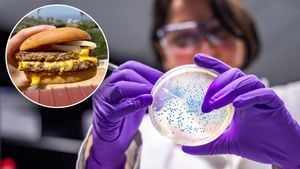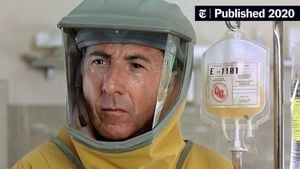Companies around the globe are assessing their growth projections as the economic climate shifts. This month, many major U.S. companies presented their forecasts amid various challenges including inflation, changing consumer behavior, and technological advancements.
Prominent names like Microsoft, Amazon, and Tesla recently shared insights on what lies ahead. At Microsoft's recent conference, CEO Satya Nadella expressed confidence, saying, "We are seeing increased demand for our cloud services as businesses begin to lean more on technology for operational efficiency." Analysts expect cloud services to help boost Microsoft's revenue substantially over the next few years.
Amazon, on the other hand, faces multifaceted challenges. Following the pandemic boom, their growth rate is expected to normalize. Analysts estimate the company will need to refocus on logistics and supply chain efficiencies to maintain its competitive edge, as e-commerce trends continue to mature. CFO Brian Olsavsky stated, "We anticipate steady, if not extraordinary growth, particularly as more consumers return to brick-and-mortar shopping."
Meanwhile, Tesla's growth narrative remains slightly different. With ambitious production goals and expansion plans for new gigafactories, CEO Elon Musk conveyed his objective to increase vehicle production significantly. "Our mission has always been to support sustainable energy and transportation, and we’ll continue to innovate and push the boundaries," Musk mentioned during their quarterly earnings call.
Global dynamics also play a role. Companies like Unilever have recalibrated their strategies to factor in inflationary pressures and shifts toward sustainability. According to Unilever's latest report, they aim to implement green initiatives which they believe will not only help the planet but also appeal to modern consumers increasingly focused on eco-friendliness. CEO Alan Jope noted, "By making sustainability our core, we’re convinced we will see not only greater customer loyalty but also long-term profit growth."
Sector-specific forecasts show varying responses to the same underlying issues. The tech sector remains buoyant, driven by the relentless pace of innovation. On the other hand, traditional retail faces headwinds as consumer spending fluctuates. The National Retail Federation has cautioned its members about the importance of adapting to consumers’ shifting buying patterns.
Industrial manufacturers are also adapting. Companies like Caterpillar are focusing on automation and smart technology to remain competitive. Caterpillar's recent earnings report showed they are investing heavily in R&D to develop more efficient production methods. CEO Jim Umpleby stated, "Innovation is at the heart of our strategy, where we blend technology with our manufacturing expertise to meet changing demands."
Across the ocean, European enterprises mirror similar sentiments. Nestlé, facing economic pressures, is pivoting toward plant-based products, seeing substantial growth opportunities. They have invested heavily to meet rising consumer demand for alternative proteins and other sustainable products.
Emerging markets also present both opportunities and risks. Companies like Procter & Gamble are reassessing strategies to penetrate these markets effectively without overextending themselves. The focus on localized products has been emphasized as consumers across different global markets have distinct needs and tastes.
Interestingly, automakers have begun to predict changing landscapes due to the shift toward electric vehicles (EVs). Ford is notable for its aggressive push for EV models, with CEO Jim Farley stating, "The future is electric, and we are fully committed to leading the charge as we transition our production." Their R&D focuses primarily on developing battery technology, which is seen as a key enabler for success.
One area drawing attention is the healthcare sector. Pharmaceutical giants like Pfizer are trying to project their growth post-COVID-19 by leaning heavily on R&D for new vaccines and therapies. They are optimistic about their pipelines and the potential for long-term growth due to the prominence of health and wellness among consumers. CEO Albert Bourla shared, "The demand for our vaccines has set new precedents, and we believe there are vast areas of need we can help address moving forward."
Investors, analysts, and consumers alike are keeping close tabs on how these predictions pan out. The fluctuations will likely influence stock prices, observable consumer trends, and the overall health of the economy. Interest rates, geopolitical issues, and environmental policies will also continue to shape these companies’ roads to growth.
Market watchers remind us to stay vigilant, as corporate growth projections are not just numbers; they represent the future direction of entire industries. These estimates are based on comprehensive analysis but often altered by outside forces like legislation and social changes, making it pivotal for companies to adapt swiftly.
Looking forward, the interplay between innovation, sustainability, and consumer preferences will likely dictate growth trajectories across sectors. Major corporations are gearing up to navigate these multifaceted challenges, striving not only to survive but to thrive as the global economy continues to evolve.



